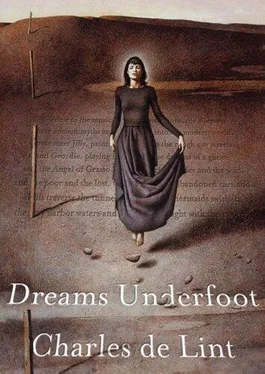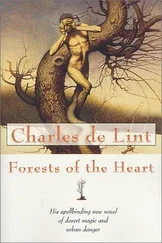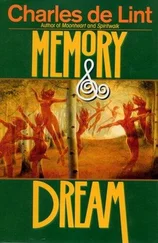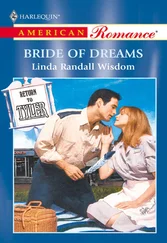That hasn’t changed much as I’ve grown older.
How that—let’s call it aloofness, for lack of a better word—translated into this socalled gift for characterization in my fiction, I can’t tell you. Maybe I put so much into the stories, I had nothing left over for real life. Maybe it’s because each one of us, no matter how many or how close our connections to other people, remains in the end, irrevocably on his or her own, solitary islands separated by expanses of the world’s sea, and I’m just more aware of it than others. Maybe I’m just missing the necessary circuit in my brain.
Tally changed all of that.
I wouldn’t have thought it, the first time I saw her.
There’s a section of the Market in Lower Crowsea, where it backs onto the Kickaha River, that’s got a kind of Old World magic about it. The roads are too narrow for normal vehicular traffic, so most people go through on bicycles or by foot. The buildings lean close to each other over the cobblestoned streets that twist and wind in a confusion that not even the city’s mapmakers have been able to unravel to anyone’s satisfaction.
There are old shops back in there and some of them still have signage in Dutch dating back a hundred years. There are buildings tenanted by generations of the same families, little courtyards, secret gardens, any number of slyeyed cats, old men playing dominoes and checkers and their gossiping wives, small gales of shrieking children by day, mysterious eddies of silence by night. It’s a wonderful place, completely untouched by the yuppie renovation projects that took over the rest of the Market.
Right down by the river there’s a public courtyard surrounded on all sides by threestory brick and stone town houses with mansard roofs and dormer windows. Late at night, the only manmade sound comes from the odd bit of traffic on the McKennitt Street Bridge a block or so south, the only light comes from the single streedamp under which stands a bench made of cast iron and wooden slats. Not a light shines from the windows of the buildings that enclose it. When you sit on that bench, the river murmurs at your back and the streetlamp encloses you in a comforting embrace of warm yellow light.
It’s one of my favorite places to write. I’ll sit there with my notebook propped up on my lap and scribble away for hours, my only companion, more often than not, a tatteredeared tom sleeping on the bench beside me. I think he lives in one of the houses, though he could be a stray. He’s there most times I come—not waiting for me. I’ll sit down and start to work and after a halfhour or so he’ll come sauntering out of the shadows, stopping a halfdozen times to lick this shoulder, that hind leg, before finally settling down beside me like he’s been there all night.
He doesn’t much care to be patted, but I’m usually too busy to pay that much attention to him anyway. Still, I enjoy his company. I’d miss him if he stopped coming.
I’ve wonder about his name sometimes. You know that old story where they talk about a cat having three names? There’s the one we give them, the one they use among themselves and then the secret one that only they know.
I just call him Ben; I don’t know what he calls himself. He could be the King of the Cats, for all I know.
He was sleeping on the bench beside me the night she showed up. He saw her first. Or maybe he heard her.
It was early autumn, a brisk night that followed one of those perfect crisp autumn days—clear skies, the sunshine bright on the turning leaves, a smell in the air of a change coming, the wheel of the seasons turning. I was bundled up in a flannel jacket and wore halfgloves to keep my hands from getting too cold as I wrote.
I looked up when Ben stirred beside me, fur bristling, sliteyed gaze focused on the narrow mouth of an alleyway that cut like a tunnel through the town houses on the north side of the courtyard. I followed his gaze in time to see her step from the shadows.
She reminded me of Geordie’s friend Jilly, the artist. She had the same slender frame and tangled hair, the same pixie face and wardrobe that made her look like she did all her clothes buying at a thrift shop. But she had a harder look than Jilly, a toughness that was reflected in the sharp lines that modified her features and in her gear: battered leather jacket, jeans stuffed into lowheeled black cowboy boots, hands in her pockets, a kind of leather carryall hanging by its strap from her shoulder.
She had a loose, confident gait as she crossed the courtyard, boot heels clicking on the cobblestones.
The warm light from the streetlamp softened her features a little.
Beside me, Ben turned around a couple of times, a slow chase of his tail that had no enthusiasm to it, and settled back into sleep. She sat down on the bench, the cat between us, and dropped her carryall at her feet. Then she leaned back against the bench, legs stretched out in front of her, hands back in the pockets of her jeans, head turned to look at me.
“Some night, isn’t it?” she said.
I was still trying to figure her out. I couldn’t place her age. One moment she looked young enough to be a runaway and I waited for the inevitable request for spare change or a place to crash, the next she seemed around my age—late twenties, early thirties—and I didn’t know what she might want. One thing people didn’t do in the city, even in this part of it, was befriend strangers. Not at night. Especially not if you were young and as pretty as she was.
My lack of a response didn’t seem to faze her in the least.
“What’s your name?” she asked.
“Christy Riddell,” I said. I hesitated for a moment, then reconciled myself to a conversation.
“What’s yours?” I added as I closed my notebook, leaving my pen inside it to keep my place.
“Tallulah.”
Just that, the one name. Spoken with the brassy confidence of a Cher or a Madonna.
“You’re kidding,” I said.
Tallulah sounded like it should belong to a ‘20s flapper, not some punky street kid.
She gave me a smile that lit up her face, banishing the last trace of the harshness I’d seen in her features as she was walking up to the bench.
“No, really,” she said. “But you can call me Tally.”
The melody of the ridiculous refrain from that song by—was it Harry Belafonte?—came to mind, something about tallying bananas. “What’re you doing?” she asked.
“Writing.”
“I can see that. I meant, what kind of writing?”
“I write stories,” I told her.
I waited then for the inevitable questions: Have you ever been published? What name do you write under? Where do you get your ideas? Instead she turned away and looked up at the sky.
“I knew a poet once,” she said. “He wanted to capture his soul on a piece of paper—really capture it.” She looked back at me. “But of course, you can’t do that, can you? You can try, you can bleed honesty into your art until it feels like you’ve wrung your soul dry, but in the end, all you’ve created is a possible link between minds. An attempt at communication. If a soul can’t be measured, then how can it be captured?”
I revised my opinion of her age. She might look young, but she spoke with too much experience couched in her words.
“What happened to him?” I found myself asking. “Did he give up?”
She shrugged. “I don’t know. He moved away.” Her gaze left mine and turned skyward once more.
“When they move away, they leave my life because I can’t follow them.”
She mesmerized me—right from that first night. I sensed a portent in her casual appearance into my life, though a portent of what, I couldn’t say.
“Did you ever want to?” I asked her.
“Want to what?”
Читать дальше












